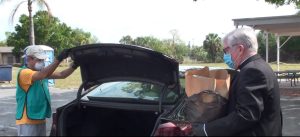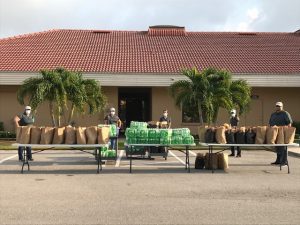Catholic Charities Diocese of Venice Inc. food pantries have become a beacon of hope in a storm of darkness – serving ever-increasing numbers of desperate families each week in response to the impact of the ongoing pandemic.
A long line of vehicles was waiting before the first bags of food were distributed on April 17, 2020, at the Elizabeth Kay Galeana (EKG) Center in Fort Myers.
Unlike when a hurricane strikes, a time when help comes from outside the region, no help can be found, except from Catholic Charities.
 The story from individuals and families in the vehicles was a common one – sudden job loss and no idea when work will be found. Words like “challenging” “hard” “difficult” and “overwhelming” were frequently used to describe how they are currently feeling. With restricted income, families must make difficult choices as many large bills for shelter and transportation come due each month.
The story from individuals and families in the vehicles was a common one – sudden job loss and no idea when work will be found. Words like “challenging” “hard” “difficult” and “overwhelming” were frequently used to describe how they are currently feeling. With restricted income, families must make difficult choices as many large bills for shelter and transportation come due each month.
As they received their food, a bag filled with basic necessities that was previously taken for granted by many, the kindness and appreciation expressed was moving and genuine with many saying, “God bless you!” and from others a simple “Thank you!” came across with great feeling and meaning.
One woman, who walked to the facility with her two grandchildren, said she was in desperate need for food as there is no money coming in and her grandchildren are home from school. This added burden is impacting many families who would normally rely on school lunch programs for children to account for at least one meal a day.
 Bishop Frank J. Dewane visited the EKG Center on April 17, 2020, assisting with the loading of vehicles as a part of the distribution operation. The Bishop also offered words of encouragement to the staff and volunteers. While there, Bishop witnessed the desperation in some, but was heartened by the gratitude for what was being offered.
Bishop Frank J. Dewane visited the EKG Center on April 17, 2020, assisting with the loading of vehicles as a part of the distribution operation. The Bishop also offered words of encouragement to the staff and volunteers. While there, Bishop witnessed the desperation in some, but was heartened by the gratitude for what was being offered.
“The need is real and this food pantry, as well as others like it across the Diocese, is made possible thanks to the generosity of our donors,” Bishop Dewane said. “I am personally grateful for the generosity of so many. I want to say, ‘Thank you!’ to those who have helped already, and I appeal for continued support during this pandemic response. Remember, no gift is too small – your combined generosity will go a long way toward helping our brothers and sisters in Christ.”
Bishop Dewane was impressed by the operation and wanted to ensure the workers and volunteers had all they needed, including masks and gloves for their own safety.

Until early March, Catholic Charities food pantries required the filling out of paperwork and limitations on receiving food to once a month. Now, each driver is asked their name and the age of everyone in their family. Further down the line, the bags of food are placed in trunks or the beds of trucks. If a family is larger, they receive more food.
Philomena Pereira, CEO of Catholic Charities Diocese of Venice Inc., said Catholic Charities has greatly expanded its food pantry operations across multiple counties to meet this growing need.
“During the last six weeks, our pantries have provided food and water to (more than 13,300) individuals and families, far more than the same period last year – and we anticipate this figure to continue climbing,” Pereira said. “Also concerning is the marked increase in demand for food resources in areas like Bonita Springs and Clewiston, where we have served up to 225 percent more families than the same period in 2019. The need is here, and it is significant. Catholic Charities, with the support of Bishop Dewane, is committed to continue to meet those needs.”
 In addition to Fort Myers, Bonita Springs and Clewiston, there are Catholic Charities food distribution points in Arcadia, Immokalee, Naples and Sarasota. While some of these locations are on a smaller scale – directly targeting specific vulnerable communities – there are five which offer drive-thru distribution each Friday morning. Additional Parish-based food banks are also operating in Bradenton, Wauchula and Fort Myers.
In addition to Fort Myers, Bonita Springs and Clewiston, there are Catholic Charities food distribution points in Arcadia, Immokalee, Naples and Sarasota. While some of these locations are on a smaller scale – directly targeting specific vulnerable communities – there are five which offer drive-thru distribution each Friday morning. Additional Parish-based food banks are also operating in Bradenton, Wauchula and Fort Myers.
Included in the bags of food is a combination of basics – rice, beans, flour, pasta – and whatever else is on hand for distribution, such as canned fruits and vegetables, cereal, sauces, peanut butter, etc. Water is distributed when requested and fresh food, such as bread, vegetables and juice are only available in limited quantities.
It is unclear just how high the demand will get, as each week the lines at the EKG Center in Fort Myers, as well as at all the food pantries, have been getting exponentially longer.
Pereira said a major challenge in keeping up with demand is that traditionally reliable sources for food, such as local Food Banks, as well as from state and federal emergency relief agencies, have little to offer because of overwhelming demand. This has required Catholic Charities to buy bulk food where it can be found.
“This is adding a huge cost that is unexpected for us, but absolutely necessary to meet the demand,” Pereira said. To help support Catholic Charities, please visit www.catholiccharitiesdov.org/donate.





